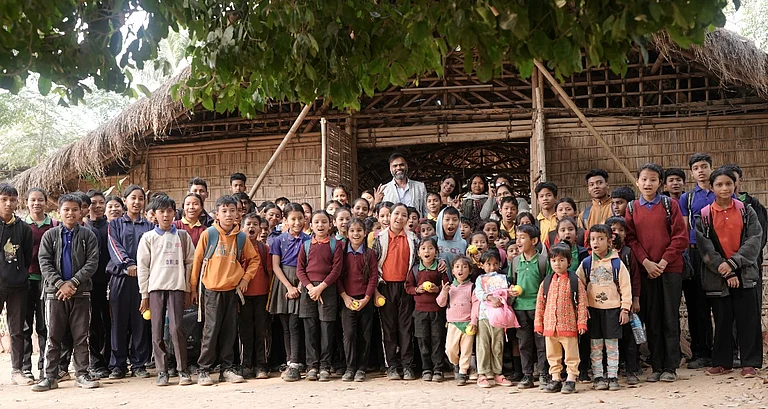Raj Kumari : UngenderedLetters
Rajkumari alias Lalan hijra is a name that doesn’t fit into a bipolarunderstanding of gender. In India, it’s also guaranteed to be a source of ostracismand shame. But, despite being ridiculed by ‘normal’ society as well as her ownsamaj, Rajkumari dared to dream—and serve. In ’93 she started the Jhuggi JhopriBal Vikas Vidyalya for slum children in Patna’s Gaighat area. With an annual budgetof just Rs 46,000, the school has 535 students on its rolls. It’s the only school inthe area where children can study free of cost and is run exclusively from the incomeearned by the members of Rajkumari’s fraternity. But since she was featured inOutlook, there have been setbacks: the school building was gutted on three occasions andlast year, just when Rajkumari was beginning to think about improving things, the districtadministration brought in the bulldozers. Not one to be deterred, Rajkumari is holdingclasses in her own house, on the roof-top in fact, in the Khara-Kuan area of the locality.Help might not be forthcoming, but she’s focused on the job.
Amarnath Tewary
Pareshbhai P. Nathvani : AShroud for Death
Stories of people who help the living—the old, ailing, thedestitute—might abound, but for Pareshbhai Premjibhai Nathvani, humanitarianism meanshelping those who can’t express their gratitude: the dead. Twenty years is a longtime. But not long enough for Nathvani to forget the day he hopped off a crowded train atMumbai’s Grant Road station to see a body lying on a stretcher on a platform. Forwant of a shroud, an advertisement banner had been used to cover the body.
Over the years, he moved on from a job at a readymade garment shop to an independentkite manufacturing-cum-real estate business. In 1992, Nathvani started supplying shroudsto Kandivli West police station—he also left about Rs 1,000 a month at the stationfor ambulance transport costs, and word that any family unable to cremate its dead shouldbe referred to him. In 1996, he extended his service to six more western suburb railwaystations. Five shrouds and a stretcher per station per month to give a little dignity tothe dead. Last year, he approached Kandivli crematorium and offered to pay cremation costsfor the poor.
Nathvani’s plans continue to run on his own fuel. Says he, "I do whatever Ican. When you do things for the living, you will be praised and thanked. From the dead,there is no praise, maybe they will tell God good things about me."
Payal Kapadia
Reny George : All AboutConviction
Ostracism is a word that evokes rage in this guardian of 45 special children.For, it annuls this man’s effort to put away the past and play a foster parent. Fouryears ago, Reny George set up the Precious Children’s Home on the outskirts ofBangalore to insulate children of prisoners from social stigma. Being an ex-convict (heserved a 14-year jail term for murder), he knows that the taint can torment one’schildren or siblings.
Reny still finds that people cringe rather than volunteer to support his mission. Sayshe, "People leave my place once I tell them I am an ex-convict. In the past, myfamily would be talked about as Reny George’s brothers or sisters, all in thenegative sense. Even now, when it’s a hand to mouth existence (all the kids are sentto a convent nearby and given uniforms and tuition), they treat me with suspicion."But this has not deterred him from plans to have the number of children under his tutelageincreased to 100 by next year. Also in the pipeline is a rehabilitation centre forex-convicts. This, he says, would prevent them from again falling prey to crime. As anexperiment, his centre has trained a couple of women (also ex-convicts) in dairy farmingand sheep-rearing. "In some cases, we have trained the wives of prisoners because welearnt that they were being exploited by rich farmers and goons in rural areas," saysTeena, Reny’s wife. But regardless of the social stigma, Reny’s work has beennoticed in some quarters: last month he was invited for a conference organised by theInternational Prison Chaplains’ Association at Johannesburg.
B.R. Srikanth
Sister Alice : A Catch ThatCounts
The aquaculture industry earns huge foreign exchange for the country andprofits for prawn exporters. But hardly any money seeps down to the female workforce thatkeeps the trade running. It was to remedy this situation that Sister Alice, a nunwho’s spent years fighting for the rights of poor fisherfolk, set up the Women’sInitiative Network (win).
Nine years on, win has succeeded in putting scores of exploited fisherwomen on the roadto self-empowerment. Alice has changed the power equations in the fishing industry bymaking the substantial female workforce less dependent on their male employers. Shedidn’t try to unionise them or seek a showdown with the management. Instead, sheorganised fisherwomen in the coastal Ernakulam and Alappuzha districts into self-helpgroups and focused on creating alternative occupation possibilities.
She began by making them financially self-supportive. The women pooled their savingsand took loans to meet their household needs. Peer pressure ensured prompt loan repayment.Alice’s self-help groups have brought financial security to about 3,000 families andalso improved the bargaining clout of fisherwomen. win’s successful foray into thefisheries sector has prompted the political establishment to cast a poacher’s eye onher "constituency". Many are now wooing fisherwomen with loans and subsidies ina bid to hijack the credit. But Alice is unfazed. For, these women, having experienced asense of fulfilment in self-reliance, aren’t ready to accept the freebies offered bypoliticians. For them, the catchword now is self-respect.
Venu Menon


























